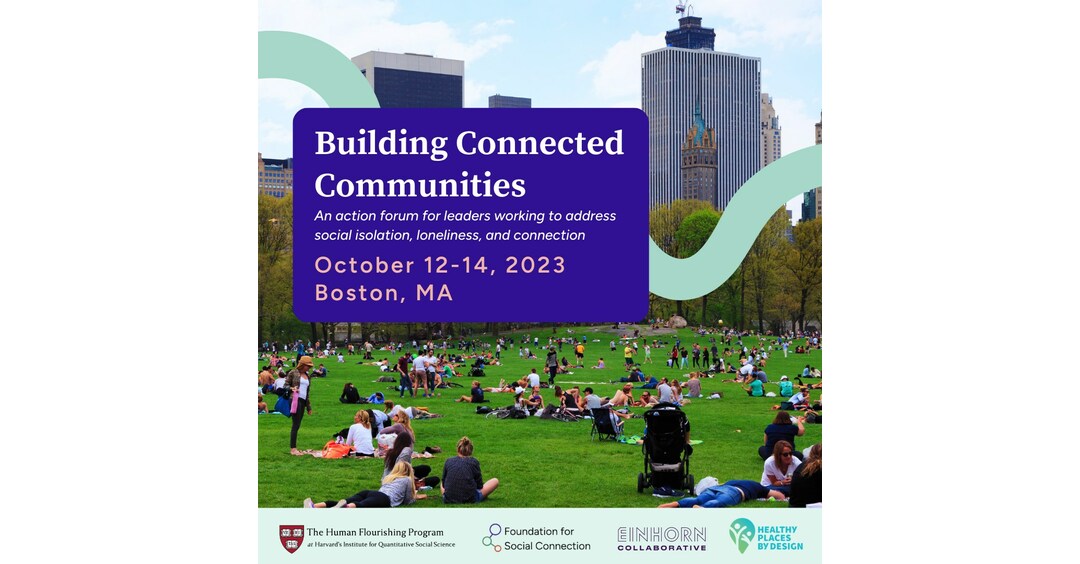BOSTON, May 30, 2023 /PRNewswire/ — Relationships play a vital role in our personal health, longevity, and life satisfaction—yet recent studies show Americans are increasingly lonely and socially isolated. With support from Einhorn Collaborative, the Foundation for Social Connection (F4SC), Harvard University’s Human Flourishing Program, and Healthy Places by Design have launched “Building Connected Communities,” a two-year initiative to foster social connection in communities across the country.
The Surgeon General’s recent advisory, Our Epidemic of Loneliness and Isolation, calls attention to the importance of social connection for individual health and on community-wide metrics of health and well-being, especially the significant consequences when social connection is lacking. Facing a crisis of connection deepened by the COVID-19 pandemic, many local leaders and organizations have taken steps to address loneliness and social isolation in their communities. These have included programs that build social networks or foster civic engagement and neighborhood improvements that encourage people to gather and interact, as well as public policies and business interventions that bolster social connection. But local leaders are also voicing a need for additional guidance and support to develop and deploy effective strategies. Guided by this need, Building Connected Communities will focus on identifying, developing, and deploying evidence-based tools, best practices, and resources that local leaders can use to strengthen social connection across all ages and stages of life.
“Across the country, communities are taking steps to increase social inclusion and a sense of belonging among residents,” said Jillian Racoosin, Executive Director of the Foundation for Social Connection. “Our goal is to lift up effective local solutions so we can all learn from their successes.”
While the project will explore solutions across the lifespan and all demographics, it will have a specific focus on at-risk populations, such as youth and adolescents, as well as members of the BIPOC, LGBTQ+, and disability communities. These various groups have strengths in building community and connection, but they have also experienced social isolation and loneliness at higher rates.
The initiative began by surfacing effective local solutions for building social connection, starting with a series of forums throughout March and April 2023, with special convenings in Atlanta, Georgia; Hennepin County, Minnesota; San Antonio, Texas; and Bangor, Maine, to gather ideas and insights from community leaders. (Have a community story to share with us? Submit your tips to help local leaders here.)
“We all have an innate yearning and capacity for connection, and it’s crucial to our individual and collective thriving from the earliest years of life through adulthood,” said Jonathan Gruber, Strategy Lead at Einhorn Collaborative. “Locally led solutions can play a powerful role in fostering socially connected and cohesive communities and addressing the many challenges that get in the way.”
Next, the Building Connected Communities team will translate its research insights into an action guide designed to provide decision-makers and community builders with a road map for promoting the kinds of social connection that contribute to collective flourishing in their communities. As future companion resources, the guide will also identify steps philanthropy and business leaders can take to improve social connectedness, including leveraging their influence and resources to design products, invest in programs, implement new systems, and advocate for policy change.
In the fall, Building Connected Communities will convene a national conference at Harvard, hosted by Harvard’s Human Flourishing Program and Foundation for Social Connection in collaboration with Einhorn Collaborative and Healthy Places by Design. This event will bring together thought leaders and researchers working in the field of loneliness and social isolation alongside civic and community leaders from communities across the country. The event will feature a session led by U.S. Surgeon General Dr. Vivek Murthy. Additional distinguished speakers include Robert Putnam, Dr. Julianne Holt-Lunstad, and United States Senator Chris Murphy (D-CT). By fostering dialogue between scholars and ground-level practitioners, Building Connected Communities will have the potential to build further the field of social connection and human flourishing research. While significant research on the physical, mental, and societal impacts of social isolation and loneliness exists, there is little evidence-informed research on systemic and community-level approaches to fostering connection.
“Social disconnection is the defining challenge of our time,” said Dr. Tyler VanderWeele, director of the Human Flourishing Program at Harvard. “This research will help us identify the connective threads running through our communities and how we can best weave them together to strengthen our social fabric.”
The Building Connected Communities conference, an expansion of F4SC’s annual End Social Isolation and Loneliness Action Forum, will take place October 12-14th, 2023, amplifying the action guide and providing opportunities for new insights and collaboration. This event is designed to elevate social connection in global health and public policy forums and act as a springboard for the movement of social connection in America and encourage stakehoder groups to test community-led strategies in 2024 and beyond.
To learn more about Building Connected Communities and how you can get involved, contact the Foundation for Social Connection at [email protected].
Foundation for Social Connection
Einhorn Collaborative
The Human Flourishing Program at Harvard’s Institute for Quantitative Social Science
Healthy Places by Design
SOURCE Coalition to End Social Isolation and Loneliness


